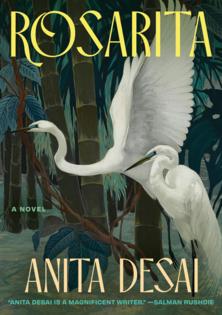Review: A woman realizes her late mother is a mystery to her in tantalizing 'Rosarita'
Published in Books News
How well do any of us know our parents?
It’s an elusive question. Most of us spend lots of time with them but certain parts of their lives are generally (and understandably) off-limits. How much is shared with the kids varies widely from family to family. All of that fits perfectly with Anita Desai’s elusive novella “Rosarita,” in which the main character, a woman from India named Bonita, learns she can’t even be sure of her mother’s name.
Her questions begin when she’s visiting Mexico and a stranger, who seems to be stalking Bonita, claims to have been dear friends with Bonita’s late mother. Her name was Sarita but this stranger insists she was a brief resident of Mexico named Rosarita. Whatever her name, she was a free spirit and an artist, according to the stranger, neither of which jibes with Bonita’s memories of her mother — who, as far as she knows, never visited Mexico.
Did Bonita’s mother have a life her family didn’t know about? Was Bonita just not paying enough attention? Has the stranger (whom Bonita calls “the Trickster”) made an error? All are possibilities in “Rosarita.” As Bonita wracks her brain for clues, she begins to believe her mother may have visited Mexico and may have had interests her daughter didn’t care about enough to interrogate.
One clue is a painting Bonita remembers. It’s of a mother and child, not paying attention to each other (ding, ding, ding) and, although Bonita isn’t certain, it could have been painted by her mother. Using that wisp of information, Bonita grasps at other straws, knowing it’s unlikely she’ll come up with definitive answers.
Desai’s writing is determined to remind us how uncertain our world is. “Rosarita” is filled with references to people who seemed to change personality in midlife, or roads that begin as residential but, at some point, shift over to businesses and restaurants. Certainty is uncertain. Just when we think we have a handle on something, the Indian American author of “In Custody” hints, that’s when we should consider that we don’t know what we’re talking about at all.
“Rosarita” underscores that by using the rarely employed second person for its narrative. In a section in which the Trickster herself seems to have morphed from a hippie to a buttoned-up businesswoman, Desai writes, “Now what role was she setting out to play, you had asked yourself and she had smiled and smiled and wouldn’t say.”
Desai won’t say, either. The book knows that each parent/child bond is different and that there may be reasons why we’re better off having a few secrets. But Desai is clearly committed to the idea that we would do well to learn as much from each other as we’re comfortable sharing. That’s about as much as you’re going to get from “Rosarita.” The lyrical book asks much of readers since it’s about questions and enigmas, not answers.
That’s why I can safely reprint its last line, which is crucial but doesn’t give away anything: “You have come as far as you can, you tell yourself; you can go no further.”
____
Rosarita
By: Anita Desai.
Publisher: Scribner, 94 pages, $22.
©2025 The Minnesota Star Tribune. Visit at startribune.com. Distributed by Tribune Content Agency, LLC.
















Comments